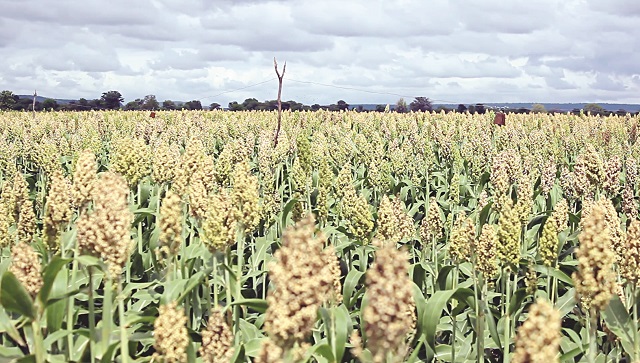Small grains bring smiles to Binga farmers

Pamenus Tuso
For many years, farmers like Ms Winet Kamutero (65) from Kariyangwe area of Binga District in Matabeleland North Province, have toiled on their irrigation plots under the brutal sun every day without much success.
The farmers who are plot-holders at Lungwalala Irrigation Scheme have every season produced little returns despite all the efforts and evidence of hard work.
The Lungwalala Irrigation Scheme was started in 1992 by the Government to address challenges associated with inconsistent rainfall patterns and arid conditions in the district. Despite glaring evidence of unimpressive performance of maize crop, most farmers like Ms Kamutero have over the years ignored and fiercely resisted agricultural and climate change advice for them to plant small grains.
Ms Kamutero and a few other farmers in the area only appreciated the importance and significance of small grains after being approached by the Matopo Research Station-based International Crop Research Institute for the Semi-Arid Tropics (Icrisat) with a view to partner them in producing small grain seed such as sorghum, rapoko and pearl millet following the devastating El Nino induced drought during the 2015/16 farming season.
Out of the 213 plot holders at the irrigation scheme, only 20 farmers agreed to venture into the project.
“When Icrisat approached us in 2016 with the idea of training us in small grains seed production and multiplication, some farmers resisted the offer, insisting on planting maize. I and other farmers took up the challenge in June the same year. Icrisat assisted us with inputs such as fertilisers, seed and pesticides,” said Ms Kamutero.
She said after harvesting the seed, the organisation took the crop to its research station on the outskirts of Matopos where it was thrashed and processed into seed.
“After Icrisat deducted everything which they advanced us including inputs, I managed to get good returns from my crop. From the proceeds, I managed to buy my own cattle, a bed and various other household utensils,” said Ms Kamutero.
She said following their success, most farmers who had initially snubbed the project now want to venture into small grain seed production in the area.
“Since I started farming, I have never realised what I did last year when I ventured into small grain seed production. I managed to buy cattle, a brand new bicycle as well as build a house. This project has really changed my life and my family and I am now respected in the community because of this project,” said another farmer who benefitted from small grain seed crop production, Mr Meikles Mwinde.
Icrisat regional director for Eastern and Southern Africa, Dr Moses Siambi said if given maximum support, Binga smallholder small grain producers have potential to contribute towards the food and seed security in the area and the country as a whole.
“I think the Binga small grain seed production underlines that even the smallholder farmers given an opportunity and right support, they can do wonders. The quality of seed is very good. The seed being produced here is standard like what is produced by established seed manufacturing companies,” said Dr Siambi.
He said the commercial production of small grain seed in Binga is not only poised to mitigate the effects of varying climate change in the country but in the Sadc region as well.
“In terms of climate change, these are the crops I would say are climate change ready. While people are busy cracking their heads on what else can adapt to the climate, we already have this crop that is climate ready that farmers in arid regions like Binga can be supported to grow without any problems. These farmers can now even sell their seed in the Sadc region and earn some money as well as contribute to climate change mitigation,” said Dr Siambi.
He challenged the Government and other stakeholders such as the Agricultural and Rural Development Authority (Arda) to support and take ownership of the scheme.
He said his organisation as a research based institute has played its part of providing foundation seed and what is left is for other stakeholders to take the initiative forward.
“Icrisat is not a seed producing company. We produce this foundation seed but other interested partners like Arda and Government should be able to take this programme forward. As Icrisat, we have demonstrated what can be done to get good quality seed but we need partners who can take this programme to a higher scale because the seed we are producing this year will definitely go a long way towards securing food and seed security either in Binga or elsewhere,” said Dr Siambi.
Arda board chairperson Mr Basil Nyabadza, said the project would help develop Binga District and urged communities to take advantage of the abundance of water at Lungwalala Dam to venture into seed production.
“We want Binga to be at par with other districts in terms of development. Binga has been lagging behind. Winter is not severe here and we can produce more commercial seed so that there is continuity. The power of seed has been ably demonstrated here. One peep is producing 1 800 peeps and that is quite significant,” said Mr Nyabadza.
He said Government is already excited about the project and would like Binga to be a hub of small grain seed production throughout the year.
“We are saying let us turn Binga into a seed multiplication centre and we are here to foster and transmit that information to our principals so that they themselves through responsible officials can augment production in the district. Binga District should be the hub for the provision of sorghum, rapoko, groundnuts, sugar beans, pearl millet all year round because of the weather which is common on this part of the country,” said Mr Nyabadza.
He urged other farmers in arid regions to venture into small grain production and other crops other than maize.
“We want maize to be the primary food in our industry of stockfeed dedicated to animals so that we cannot continue competing with pigs and chickens. I believe in countries like Australia, maize is part of their staple food for the stockfeed industry,” said Mr Nyabadza.
The provincial crops and livestock officer for Matabeleland North Province, Mr Dumisani Nyoni praised the farmers and Icrisat saying the Government, research centre and farmers’ partnership is crucial as it would go a long way in ensuring food security for the nation.
The core focus of food security in Southern Africa is sustainable access to safe and adequate food at times. Poverty, drought and chronic diseases can result in food system failures or chronically inadequate nutrition, making food security a top priority within the Sadc region.
In August last year, President Mnangagwa, who was then vice president and leader of the Food Security and Nutrition Cluster under ZimAsset toured Icrisat research centre and pledged Government’s support to the institution in working with smallholder farmers to improve food security for the nation.











Comments